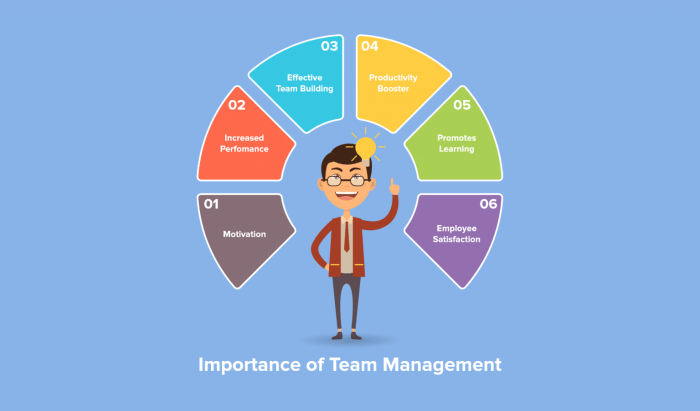Team Management Skills: Mastering the Art of Leading Teams kicks off with a bang, offering a glimpse into the world of effective team management. From boosting productivity to fostering morale, this topic delves into the essentials of successful team leadership. Get ready to unlock the secrets to becoming a top-notch team manager!
Importance of Team Management Skills

Team management skills are crucial in the workplace as they help in coordinating efforts, maximizing resources, and achieving common goals. Effective team management can lead to increased productivity and morale among team members. When a team is well-managed, individuals are clear about their roles and responsibilities, communication flows smoothly, and conflicts are resolved efficiently.
Enhanced Collaboration
- Teams with strong management skills foster collaboration among members, leading to innovative solutions and better decision-making processes.
- By promoting a culture of trust and respect, team management can create a supportive environment where team members feel valued and motivated to contribute their best.
- Effective delegation of tasks and responsibilities ensures that each team member plays to their strengths, resulting in a more efficient and successful team overall.
Impact of Poor Team Management
- Poor team management can result in confusion, lack of direction, and a breakdown in communication, leading to missed deadlines and subpar work quality.
- When team dynamics are strained due to ineffective management, team members may feel demotivated, disengaged, and even resentful towards their colleagues.
- Issues like favoritism, micromanagement, and lack of feedback can arise in poorly managed teams, creating a toxic work environment that hampers productivity and overall success.
Key Components of Team Management Skills
Effective team management skills are comprised of several key components that are essential for leading a successful team. Communication, leadership, conflict resolution, empathy, and emotional intelligence all play significant roles in the overall management of a team.
Communication
Communication is vital in team management as it ensures that team members are on the same page, understand their roles and responsibilities, and can effectively collaborate with one another. Clear and open communication fosters trust and transparency within the team, leading to better outcomes and a more cohesive work environment.
Leadership
Strong leadership is crucial for guiding and motivating team members towards a common goal. A good leader sets a positive example, provides direction, delegates tasks effectively, and offers support when needed. Effective leadership empowers team members to perform at their best and contributes to overall team success.
Conflict Resolution, Team management skills
Conflict is inevitable in any team setting, but how it is managed can make a significant difference in team dynamics. Effective conflict resolution involves addressing issues in a timely and constructive manner, promoting open dialogue, and finding mutually beneficial solutions. By resolving conflicts efficiently, teams can maintain productivity and foster a positive work environment.
Empathy and Emotional Intelligence
Empathy and emotional intelligence are essential in understanding the perspectives and emotions of team members. By being empathetic, team managers can build stronger relationships, demonstrate genuine care for their team, and create a supportive and inclusive work culture. Emotional intelligence allows managers to navigate complex interpersonal dynamics, handle stress effectively, and make informed decisions based on both logic and emotions.
Developing Team Management Skills
Developing strong team management skills is essential for effective leadership and successful teamwork. It requires a combination of self-awareness, communication, problem-solving, and adaptability. Here are some strategies to help individuals improve their team management abilities:
Continuous Learning and Feedback
Continuous learning and feedback play a crucial role in enhancing team management skills. By seeking out opportunities for professional development, attending relevant workshops or training programs, and actively seeking feedback from team members, leaders can continue to refine their management skills. This ongoing process of learning and growth allows individuals to stay ahead of the curve and adapt to the ever-changing dynamics of team management.
- Participate in leadership development programs offered by professional organizations or universities to enhance skills in team building, conflict resolution, and decision-making.
- Engage in mentorship programs or coaching sessions to receive personalized feedback and guidance on improving management techniques.
- Attend workshops or seminars focused on emotional intelligence, communication styles, and effective delegation to strengthen interpersonal skills within the team.
Challenges in Team Management: Team Management Skills

Leading a team comes with its own set of challenges that team managers need to navigate effectively. From communication breakdowns to conflicting personalities, there are various obstacles that can hinder team productivity. In this section, we will explore common challenges faced by team managers and strategies to overcome them.
Managing Conflicts Within the Team
Conflicts are bound to arise when individuals with different backgrounds, opinions, and work styles come together in a team. Effective team managers address conflicts promptly by encouraging open communication, active listening, and facilitating a resolution process. By promoting a culture of respect and collaboration, team managers can prevent conflicts from escalating and maintain a harmonious work environment.
Dealing with Lack of Motivation
Motivation plays a crucial role in driving team performance. Team managers face the challenge of keeping team members engaged and motivated, especially during challenging projects or periods of uncertainty. To overcome this obstacle, effective team managers recognize individual strengths, provide meaningful feedback, and create opportunities for growth and development. By fostering a positive work environment and acknowledging team achievements, managers can boost morale and inspire team members to perform at their best.
Addressing Poor Performance
When a team member is consistently underperforming, it can impact the overall team’s success. Team managers need to address poor performance promptly and constructively. By setting clear expectations, providing necessary training and support, and offering constructive feedback, managers can help underperforming team members improve their skills and contribute effectively to the team. It is essential for team managers to approach performance discussions with empathy and a focus on improvement rather than punishment.